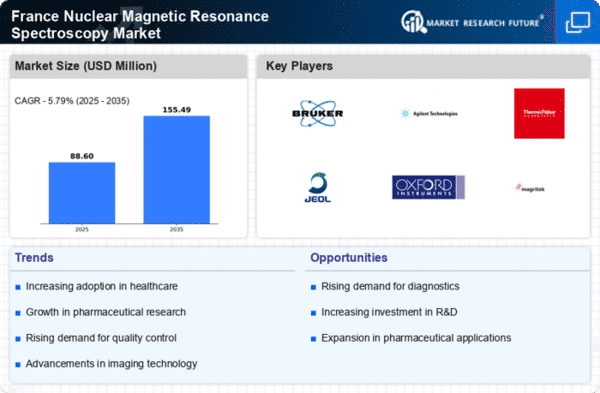Growing Focus on Environmental Testing
The nuclear magnetic-resonance-spectroscopy market is witnessing a growing emphasis on environmental testing, particularly in France, where regulatory frameworks are becoming increasingly stringent. NMR spectroscopy is recognized for its ability to analyze complex mixtures and detect contaminants in soil and water samples. As environmental concerns escalate, industries are compelled to adopt advanced analytical techniques to ensure compliance with regulations. The market for NMR applications in environmental testing is expected to expand significantly, with estimates suggesting a growth rate of around 5% annually. This shift not only enhances the credibility of environmental assessments but also positions the nuclear magnetic-resonance-spectroscopy market as a critical player in sustainability efforts.
Increased Investment in Healthcare Research
The nuclear magnetic-resonance-spectroscopy market is benefiting from heightened investment in healthcare research, particularly in France, where public and private sectors are channeling funds into innovative medical research. NMR spectroscopy plays a pivotal role in drug discovery and development, enabling researchers to elucidate molecular structures and interactions. The French government has allocated substantial resources to support biopharmaceutical research, which is anticipated to drive the demand for NMR technologies. With an estimated growth of 7% in the healthcare research sector, the nuclear magnetic-resonance-spectroscopy market is poised to capitalize on this trend, as more institutions seek to incorporate advanced analytical methods into their research protocols.
Technological Advancements in NMR Equipment
The nuclear magnetic-resonance-spectroscopy market is experiencing a surge in technological advancements, particularly in the development of high-field NMR spectrometers. These innovations enhance sensitivity and resolution, making them indispensable in various applications, including pharmaceuticals and materials science. In France, the market for NMR equipment is projected to grow at a CAGR of approximately 6.5% from 2025 to 2030, driven by the increasing demand for precise analytical tools. Furthermore, the integration of automation and software improvements in NMR systems is likely to streamline workflows, thereby attracting more users from diverse sectors. This trend indicates a robust future for the nuclear magnetic-resonance-spectroscopy market, as researchers and industries seek to leverage advanced technologies for better outcomes.
Expansion of Academic and Research Institutions
The nuclear magnetic-resonance-spectroscopy market is experiencing growth due to the expansion of academic and research institutions in France. Universities and research centers are increasingly investing in NMR facilities to support a wide range of scientific inquiries, from chemistry to biology. This trend is likely to enhance the accessibility of NMR technology for students and researchers, fostering innovation and collaboration. With an estimated increase of 10% in research funding allocated to NMR-related projects, the market is expected to benefit from a steady influx of new users and applications. This expansion not only strengthens the nuclear magnetic-resonance-spectroscopy market but also contributes to the overall advancement of scientific knowledge in the region.
Rising Demand for Quality Control in Manufacturing
The nuclear magnetic-resonance-spectroscopy market is increasingly recognized for its applications in quality control within manufacturing processes. In France, industries such as food and beverage, chemicals, and polymers are adopting NMR techniques to ensure product consistency and safety. The ability of NMR to provide non-destructive testing and detailed compositional analysis makes it a valuable tool for manufacturers. As quality standards tighten, the market is projected to grow by approximately 4.5% annually, reflecting the need for reliable analytical methods. This trend underscores the importance of the nuclear magnetic-resonance-spectroscopy market in maintaining high-quality production standards across various sectors.



















Leave a Comment